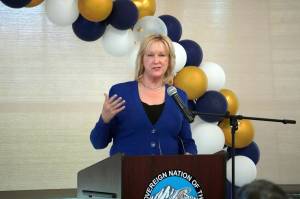Opinion: Plan to review oil spill plans not about gutting regulations
Published 9:30 pm Sunday, November 10, 2019


My work with the Alaska Department of Environmental Conservation (DEC) began as manager of its oil spill planning and response programs several months before the 1989 T/V Exxon Valdez oil spill.
I am currently the deputy commissioner. During my almost 30-year career I have served as the deputy commissioner and director of two divisions and worked under multiple administrations (Republican, Democrat and Independent).
When the Exxon Valdez spill occurred, we (me, you, state and federal agencies, industry, fishermen, businesses, and every individual directly or indirectly affected by the spill) were woefully unprepared.
In the wake of the spill, new statutes passed, regulations were written, staffing was increased, citizen involvement improved, escort tugs and double-hulled tankers were put in place, and spill prevention, planning, and preparedness for response began in earnest. My fingerprints are on almost all of that. There is no doubt another spill of that magnitude would still be a disaster, but it’s one we work hard to prevent and we are much better prepared to respond should another disaster occur.
Recently, DEC announced a 90-day public scoping process to collect public input on statutes and regulations regarding oil discharge prevention and contingency planning, many of which are nearly 30 years old. No changes are currently being proposed, but everything deserves to be looked at.
We have simply asked you, the public, to review those existing rules and provide feedback. Are there requirements that are working well? Are there provisions that could be updated to reflect current risks and technologies? Has another jurisdiction “built a better mousetrap” that we should consider? Are there outdated requirements that don’t actually help prevention or response to spills? Are there provisions that should be more stringent? Are we missing anything?
Let’s not wait for another disaster to force us into an “after-the-fact” review.
The two oil spill Regional Citizens Advisory Councils (established under federal law after the Exxon spill), however, appear to have mistakenly concluded that this is an effort to gut the regulatory protections and have asked DEC to rescind the public scoping process.
As federally sanctioned “watchdog” groups, I would instead ask them to welcome an open invitation to participate in a thorough and transparent review of our spill prevention and response requirements.
DEC is using a new method for this scoping effort where all comments are posted instantly on our website for all to see. DEC seeks input from the public, Regional Citizens Advisory Councils, and the regulated community to see if there are ways to update the regulations while maintaining or even improving environmental protection.
Alaska can be open for business AND protect the environment. They are not mutually exclusive.
I encourage everyone, particularly those with firsthand experience with contingency planning, major spills, laws, and regulations, to provide your input to DEC by Jan. 15, 2020. Comments can be viewed and submitted at http://alaskadec.commentinput.com/.
In the end, DEC may decide the rules remain appropriate and relevant and not propose any changes. If we do propose improvements to spill prevention and response, those specific changes will go through their own public notice and comment period. What they won’t do is gut oil spill planning, preparedness, and response — not on my watch.
Lynn Kent is the deputy commissioner of the Alaska Department of Environmental Conservation.
Lynn Kent is the deputy commissioner of the Alaska Department of Environmental Conservation.






